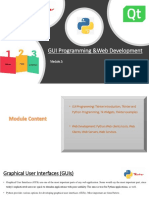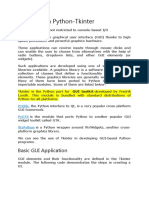0 ratings0% found this document useful (0 votes)
165 viewsGUI Programming in Python Using TKINTER
This document discusses building graphical user interfaces (GUIs) in Python using the Tkinter module. It covers adding widgets like labels, buttons, entries and text boxes to a GUI, organizing widgets using frames and geometry managers, making GUIs interactive with events and handlers, and provides examples of building temperature converter and text editor applications.
Uploaded by
Marketing InfodalCopyright
© © All Rights Reserved
Available Formats
Download as DOCX, PDF, TXT or read online on Scribd
0 ratings0% found this document useful (0 votes)
165 viewsGUI Programming in Python Using TKINTER
This document discusses building graphical user interfaces (GUIs) in Python using the Tkinter module. It covers adding widgets like labels, buttons, entries and text boxes to a GUI, organizing widgets using frames and geometry managers, making GUIs interactive with events and handlers, and provides examples of building temperature converter and text editor applications.
Uploaded by
Marketing InfodalCopyright
© © All Rights Reserved
Available Formats
Download as DOCX, PDF, TXT or read online on Scribd
You are on page 1/ 1
GUI Programming In Python Using TKINTER
Building Your First Python GUI Application With Tkinter
Adding a Widget
Check Your Understanding
Working With Widgets
Displaying Text and Images With Label Widgets
Displaying Clickable Buttons With Button Widgets
Getting User Input With Entry Widgets
Getting Multiline User Input With Text Widgets
Assigning Widgets to Frames With Frame Widgets
Adjusting Frame Appearance With Reliefs
Understanding Widget Naming Conventions
Check Your Understanding
Controlling Layout With Geometry Managers
The .pack() Geometry Manager
The .place() Geometry Manager
The .grid() Geometry Manager
Check Your Understanding
Making Your Applications Interactive
Using Events and Event Handlers
Using .bind()
Using command
Check Your Understanding
Building a Temperature Converter (Example App)
Building a Text Editor (Example App)
Conclusion
Additional Resources
You might also like
- Tkinter GUI Application Development Blueprints - Sample Chapter100% (6)Tkinter GUI Application Development Blueprints - Sample Chapter45 pages
- Introduction-to-GUI-Programming-with-Python-TkinterNo ratings yetIntroduction-to-GUI-Programming-with-Python-Tkinter9 pages
- APznzabD42k0LAvBow5UWo2PAFhZu5cy1YK-SfkarVg5ydWGRfUIy7U7ZVnOq2SxnE35wbuoGtr4TxHjL1ThsIuibD8pB_26mlB9uFY-AP...9eB6NTlXyrjjkzMbWt32lGK0nsynpCCQDvlkKgVlR_2bGBZuohpuEhmh2CZKhBVdd5fAb62RMYteVsD7yLiTP_5TKTZCitq3-Xs6b8XhtZRdTHqnHTD4ej32zhNo ratings yetAPznzabD42k0LAvBow5UWo2PAFhZu5cy1YK-SfkarVg5ydWGRfUIy7U7ZVnOq2SxnE35wbuoGtr4TxHjL1ThsIuibD8pB_26mlB9uFY-AP...9eB6NTlXyrjjkzMbWt32lGK0nsynpCCQDvlkKgVlR_2bGBZuohpuEhmh2CZKhBVdd5fAb62RMYteVsD7yLiTP_5TKTZCitq3-Xs6b8XhtZRdTHqnHTD4ej32zh8 pages
- Python GUI Programming With Tkinter Developing User-Friendly Interfaces With Tkinter in Python (Jones, Andrew M.)No ratings yetPython GUI Programming With Tkinter Developing User-Friendly Interfaces With Tkinter in Python (Jones, Andrew M.)141 pages
- Python GUI Programming With Tkinter - Real PythonNo ratings yetPython GUI Programming With Tkinter - Real Python62 pages
- Keith Tab W Tkinter Tutorial Learn TkinterNo ratings yetKeith Tab W Tkinter Tutorial Learn Tkinter241 pages
- Python GUI Programming With Tkinter - Real PythonNo ratings yetPython GUI Programming With Tkinter - Real Python52 pages
- Desktop Programming in Python With TkinterNo ratings yetDesktop Programming in Python With Tkinter6 pages
- GUI Programming in Python Using TkinterNo ratings yetGUI Programming in Python Using Tkinter47 pages
- 100 Project Topic For Python GUI From Beginner To Advanced LevelNo ratings yet100 Project Topic For Python GUI From Beginner To Advanced Level4 pages
- Gui and Web Programming Notes Unit 4 - WatermarkNo ratings yetGui and Web Programming Notes Unit 4 - Watermark92 pages
- Ebook Python GUI Programming With TkinterNo ratings yetEbook Python GUI Programming With Tkinter63 pages
- Slides From INF3331 Lectures - Basic GUI Programming in PythonNo ratings yetSlides From INF3331 Lectures - Basic GUI Programming in Python62 pages
- Xamarin Mobile Application Development for Android - Second EditionFrom EverandXamarin Mobile Application Development for Android - Second EditionNo ratings yet



























































